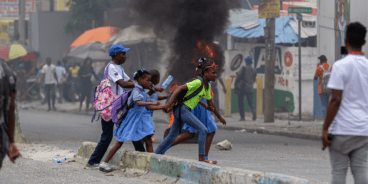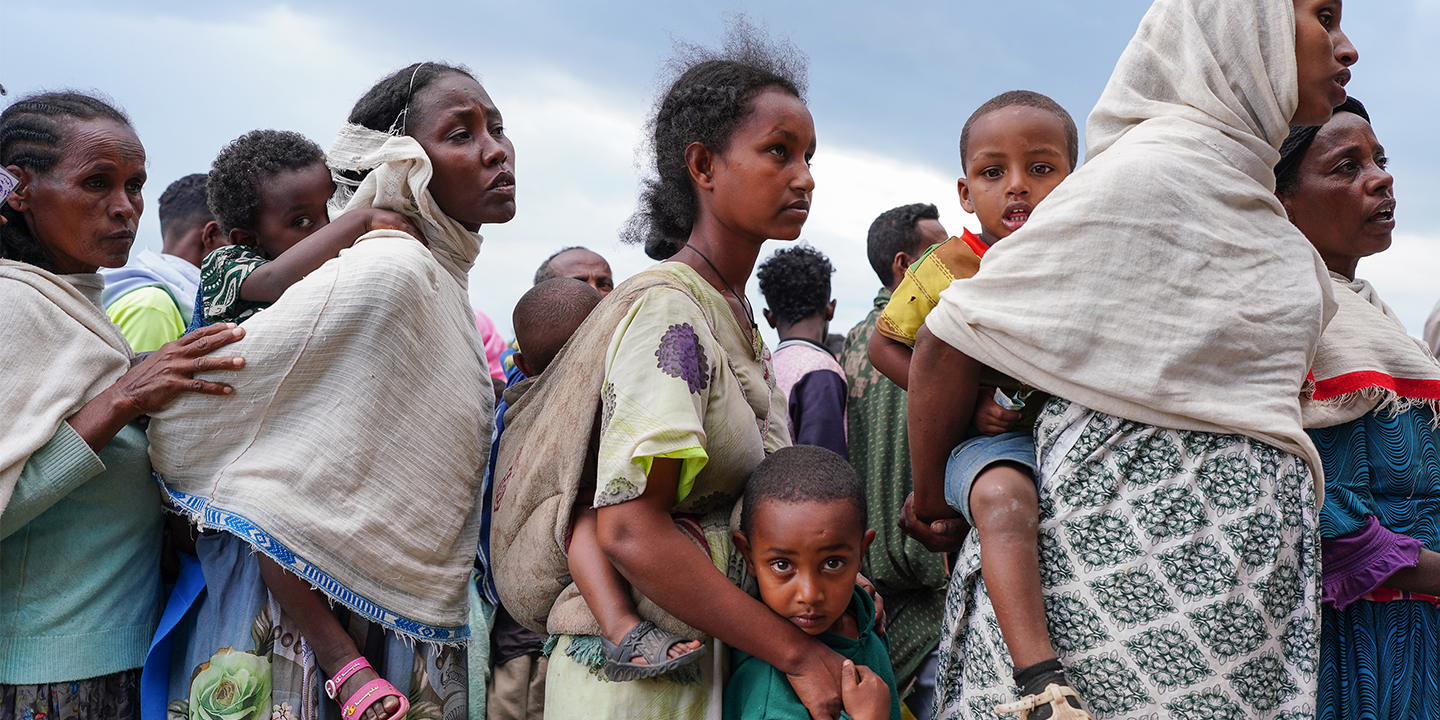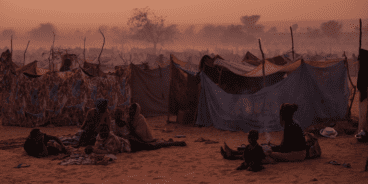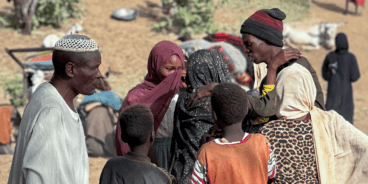

Atrocity Alert No. 281: Ethiopia, Sudan and Myanmar (Burma)
Atrocity Alert is a weekly publication by the Global Centre for the Responsibility to Protect highlighting situations where populations are at risk of, or are enduring, mass atrocity crimes.
SEXUAL VIOLENCE AND LARGE-SCALE DISPLACEMENT CONTINUE ACROSS NORTHERN ETHIOPIA
A group of 10 UN Special Procedures, Human Rights Council (HRC)-mandated human rights experts, expressed grave concern on 3 December regarding widespread sexual and gender-based violence committed against women and girls in the Tigray, Amhara and Afar regions of Ethiopia by parties to the conflict. According to the experts’ statement, a total of 2,204 survivors reported incidents of sexual violence to health facilities across Tigray from November 2020-June 2021. The number of incidents is likely significantly underreported given stigmatization and inaccessibility to health or support centers. Essential aid and humanitarian workers, who are providing health care, mental health and psychosocial support services for victims and survivors, have been routinely targeted and obstructed from reaching vulnerable populations.
On 7 December Pramila Patten, UN Special Representative of the Secretary-General on Sexual Violence in Conflict, also expressed concern regarding ongoing sexual and gender-based violence, highlighting its systematic use “as a weapon of war, a form of retaliation, punishment, humiliation and… to stigmatize individuals based on their real or perceived ethnic identity.” Ms. Patten said that the UN has documented “numerous and disturbing” patterns of sexual violence that have been perpetrated with “appalling levels of brutality,” including cases of rape and gang rape.
An estimated 9.4 million people in northern Ethiopia are in urgent need of humanitarian assistance amidst ongoing offensives in the Tigray, Amhara and Afar regions. An increase in fighting in Chifra Woreda, Afar region, has newly displaced tens of thousands of people. Large-scale displacement is also occurring in Western Tigray, which is currently under the control of Amhara regional forces and their allies. At least 21,000 newly displaced persons have arrived in other areas of Tigray since 22 November following reports of Amhara forces raiding areas of Western Tigray. The UN estimates that more than 1.2 million people have been displaced from Western Tigray to other parts of Tigray since the start of the conflict last year.
Worrying patterns of ethnic targeting are continuing outside the conflict zone. After the government announced a sweeping state of emergency on 2 November, authorities in Ethiopia’s capital, Addis Ababa, have commenced house-to-house searches for anyone deemed “sympathetic” to the Tigray People’s Liberation Front, targeting Tigrayan residents. According to the Office of the UN High Commissioner for Human Rights, from 9-16 November more than 1,000 Tigrayans were arrested, including dozens of UN staff and subcontractors. Reports indicate that tens of thousands of Tigrayans are being kept in makeshift detention centers in deplorable conditions.
Given the pervasive and systematic nature of the ongoing atrocities throughout Ethiopia, urgent action is needed to not only end the fighting but also to ensure accountability for victims. All parties to the conflict must immediately facilitate full and unhindered humanitarian access to populations, including survivors of conflict-related sexual violence. The international community should support the regional African Union-led negotiation efforts, as well as urgently hold a special session of the HRC in order to establish an investigative mechanism into all war crimes and crimes against humanity, including sexual and gender-based violence, in Ethiopia.
WHILE ALL EYES ARE ON KHARTOUM, INTER-COMMUNAL VIOLENCE INTENSIFIES IN DARFUR
On Sunday, 5 December, Arab Janjaweed militia attacked the Kreinik displacement camp in Sudan’s West Darfur region, torching houses, killing at least 48 people and injuring 40 others. The clashes allegedly grew out of a financial dispute between two individuals in the displacement camp. This deadly clash is part of a new wave of inter-communal violence in the Darfur region that has escalated in intensity and frequency in recent months.
From 9 October to 20 November, the African Centre for Justice and Peace Studies documented nine incidents involving attacks on civilians in West and North Darfur. Clashes between Arab herders and farmers of the Misseriya Jebel community in West Darfur’s Jebel Moon locality from 17-19 November resulted in at least 50 people killed, nearly 10,000 people displaced and 594 houses destroyed and looted. According to the UN Office for the Coordination of Humanitarian Affairs, the situation in Jebel Moon remains “tense and unpredictable.” Meanwhile, the UN Refugee Agency (UNHCR) reported on 7 December that its teams have received “alarming reports” from other parts of Darfur about sexual violence and the destruction of villages.
While inter-communal clashes are not uncommon during the harvest season and are often related to nomadic movements, the level of violence has spiked since the joint United Nations-African Union Hybrid Operation in Darfur withdrew in December 2020. Throughout 2021, UNHCR has recorded more than 200 incidents of violence in the Darfur region.
Such clashes pose a significant challenge to Sudanese authorities who are grappling with bringing an end to decades-long conflict and atrocities in Darfur, South Kordofan and Blue Nile states. During his 30-year dictatorship, former President Omar al-Bashir and other government officials were responsible for crimes against humanity, war crimes and acts of genocide while fighting armed groups in these states. Following Bashir’s ousting in April 2019, considerable progress has been made in bringing parties to the conflict together, including the historic Juba peace agreement signed in October 2020 between the government and several armed groups.
However, the 25 October military coup may impede these peacebuilding efforts. The recent spate of attacks in Darfur has also largely been overshadowed by the political turmoil and government crackdown in Khartoum and other large cities following the coup.
On 25 November the UN Integrated Transition Assistance Mission in Sudan reminded the Sudanese authorities that “their responsibility to protect civilians is not diminished despite the current political situation.” The ongoing political instability in Khartoum should not distract the authorities from urgently addressing increasing violence and advancing peacebuilding efforts in Darfur. Sudanese authorities must also take immediate steps to disarm ethnic militias and other armed groups, ensure justice for past atrocities, and provide effective protection to all vulnerable populations in Darfur.
MILITARY CONVICTS AUNG SAN SUU KYI AMID ONGOING VIOLENCE THROUGHOUT MYANMAR
On 6 December a military-controlled court convicted and sentenced Aung San Suu Kyi, Myanmar’s (Burma) deposed civilian leader, in a sham trial to four years of imprisonment. Suu Kyi and co-defendant U Win Myint, Myanmar’s deposed President who was convicted the same day, were sentenced on politically-motivated charges of inciting dissent and breaking COVID-19 protocols. Myanmar’s military – the Tatmadaw – later reduced their sentences to two years of imprisonment at an undisclosed location.
UN Special Rapporteur on the situation of human rights in Myanmar, Tom Andrews, emphasized that, “this proceeding should not be confused with an actual trial – it is theatre of the absurd and a gross violation of human rights. Aung San Suu Kyi, and thousands of others, are being arbitrarily detained in a system of injustice, guilty of only exercising their fundamental rights.” The continued arbitrary detention of Suu Kyi, President Win Myint and numerous members of the National League for Democracy also underscores the military’s determination to strangle all political opposition.
A day prior to the convictions, the military rammed a truck into a group of peaceful anti-coup protesters and then fired upon them with live ammunition in Kyimyindaing Township, in western Yangon. At least five people were killed and dozens of protesters injured. The military also arrested several people following the attack. That night, residents in several Yangon townships resumed the practice of banging pots and pans in protest of the coup and in condemnation of the Yangon attack. Ramanathan Balakrishnan, UN resident coordinator in Myanmar, stated that those responsible for the “excessive and disproportionate use of force against unarmed civilians must be held to account.”
The military continues to perpetrate attacks against populations across Myanmar, particularly in upper Myanmar. On 7 December the Tatmadaw reportedly burned alive 11 men and teenagers in Sagaing Region’s Salingyi Township in apparent retaliation over militia offensives. On 4 December the Tatmadaw perpetrated another assault on now-deserted Thantlang in Chin State, destroying at least 19 buildings, including another church.
On 6 December the UN General Assembly deferred the decision on who will represent Myanmar at the UN, rejecting the Tatmadaw’s application for credentials and allowing U Kyaw Moe Tun, the current Permanent Representative of Myanmar, to continue representing the country. The decision was a welcome one, but ongoing violence in Myanmar demonstrates that the UN must take more substantial action, including imposing an arms embargo on the country.
Related Content


Twenty years of the Responsibility to Protect and the unfulfilled promise in Darfur
